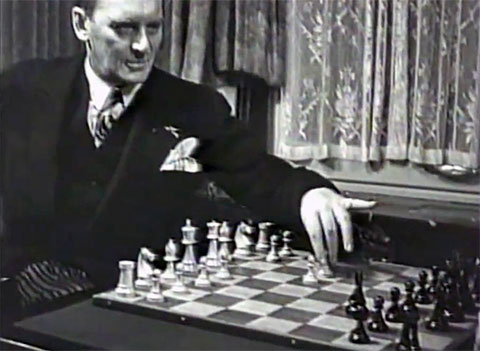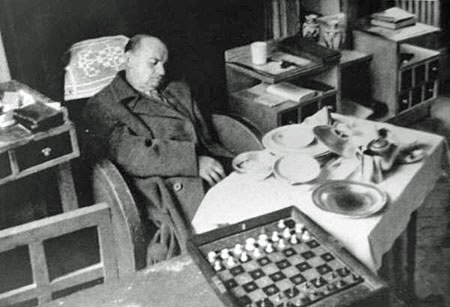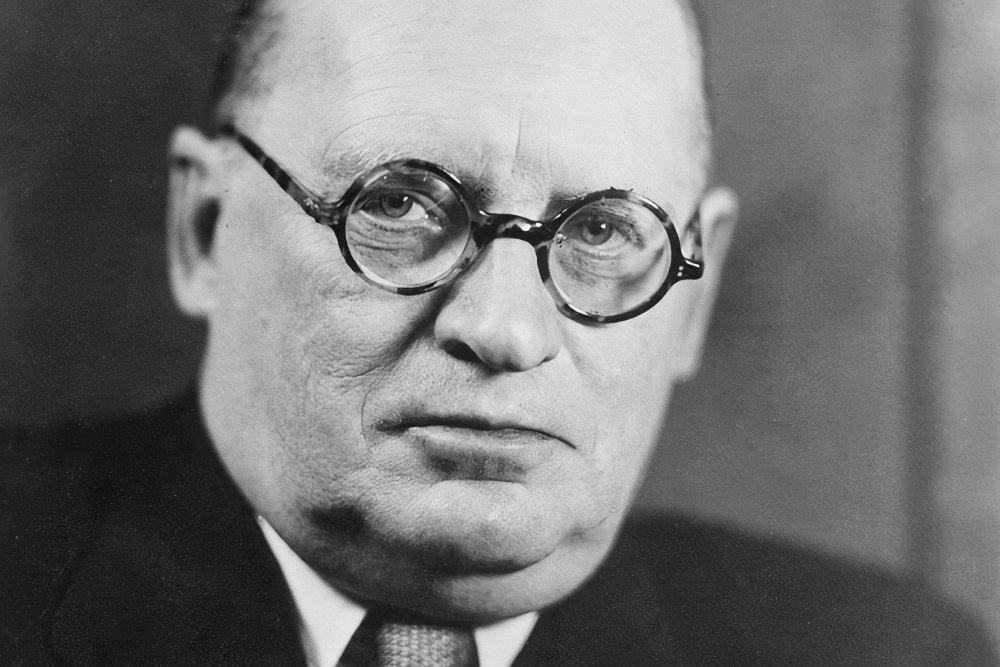In 1939, before the Second World War, the world was still and again all right for Alexander Alekhine. In 1935 he had surprisingly lost the World Championship against Dr. Max Euwe but by winning the revenge match in 1937 Alekhine had regained the title.

Alekhine in 1935, during the World Championship match against Euwe
Alekhine lived in France, was respected, wealthy and married to Grace Wishaar, an American artist who had inherited a fortune from her late first husband.
At the Chess Olympiad 1939 in Buenos Aires, Alekhine played for France and won gold for the the best result on board one: with a score of with 12.5 out of 16 (78%), he was narrowly ahead of Paul Keres (14.5/19, 76%) who played for Estonia, and Alekhine's old rival Capablanca, who played for Cuba and finished with 11.5/16 (72%). But during the Olympiad, on 1 September 1939, German troops invaded Poland and the Second World War began, which was to change Alekhine's life fundamentally.
A number of chess players – of whom Miguel Najdorf is probably the best known – stayed in Argentina after the Olympiad but Alekhine went back to Europe and served in the French Army until he was demobilized in 1940. And during the Olympiad Alekhine had shown no sympathy for the German regime, and players of the German team had even complained about the World Champion's hostile attitude towards them.
But after the rapid and huge military successes of the Germans at the beginning of the war, Alekhine changed his behaviour. According to Rohrer, he pursued a "two-pronged strategy" to try to maintain his status as World Champion and to maintain his high standard of living.
Having previously systematically avoided a possible rematch against Capablanca, whom he had beaten in the 1927 World Championship match in Buenos Aires, he now contacted Capablanca to organise such a rematch. Alekhine hoped to play against Capablanca in South America, and he hoped for a high prize fund, as this would have given him the chance to leave Europe with his wife and to make a new start with the money from the match.
But the negotiations with Capablanca came to nothing and so Alekhine concentrated on the other part of his strategy: he helped the Nazis who had occupied Paris in June 1940. In 1941 he published a series of articles on "Aryan and Jewish Chess" in the "Pariser Zeitung", a propaganda organ of the Germans, in which he applied Nazi ideology to chess using numerous anti-Semitic clichés, grossly distorting chess-historical facts. Later attempts by Alekhine to distance himself from this series of articles are, as Rohrer explains, unconvincing.
"Alekhine, whether every word is his or not, bears responsibility for these articles. They appeared under his name in the German-language press and were able to develop their effect there with the weight of his name. I consider it impossible that the articles appeared against Alekhine's will. Alekhine himself boasted in Spanish newspapers in September 1941 about his treatment of chess from the 'racial point of view'." ("Alekhine's Two-Pronged Strategy: An Interview with Christian Rohrer", Karl, 01/2021, p. 53)
In 1941, Alekhine played a tournament in German-occupied Krakow in Poland and came into contact with a number of influential Nazis, most notably Hans Frank, the Governor General of Poland. As Governor General, Frank was largely responsible for the persecution and murder of millions of Jews, and after the war he was sentenced to death at the Nuremberg War Crimes Trial and executed on 16 October 1946.
Frank was a great chess fan who maintained a friendly relationship with Alekhine, and these contacts helped Alekhine to get a well-paid job at the Institut für Deutsche Ostarbeit (Institute for German Work in the East", IDO for short. Alekhine received the equivalent of 1,000 Reichsmarks per month, and according to Rohrer, this salary was more than 98% of Germans earned at the time. Moreover, Alekhine still had the possibility to secure additional income through simuls, fees for books and articles as well as appearance and prize money at tournaments.
But when the defeat of the Germans in the Second World War became more and more likely, Alekhine left the territory of the German Reich in October 1943 and went to Spain, which was ruled by the fascists under Franco but was not involved in hostilities. Alekhine still had no material worries, but health problems plagued him.
As Rohrer reports, Alekhine had gone to a psychiatric clinic in 1943 after showing signs of mental confusion, and he continued to go downhill in the period after that. When Alekhine moved from Spain to Portugal in 1945, he suffered from financial hardship, health problems and was ostracised in the chess world due to his proximity to the Nazis. In a hotel in Estoril in Portugal, Alekhine died on 24 March 1946, still reigning World Champion.

The corpse of Alekhine
Rohrer carefully and in detail examines the life of Alekhine during the Second World War, briefly sketched here. After research in archives all over Europe, Rohrer comes to a number of new insights into Alekhine's fate and personality (among other things, one learns that Alekhine together with Ossip Bernstein was a member of a Masonic lodge in Paris and simply claimed to have a doctor's degree though he had not written a dissertation), and at the same time provides a fine example of how the study of chess history can help to gain insights into larger historical contexts.
On this DVD GMs Rogozenco, Marin, Müller, and IM Reeh present outstanding games, stunning combinations and exemplary endgames by Alekhine. And they invite you to improve your knowledge with the help of video lectures, annotated games and interactive tests
Links

























